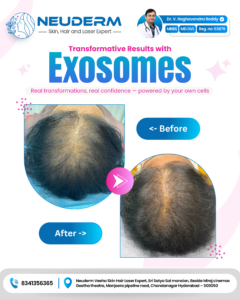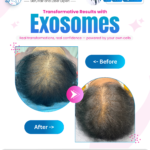
URTICARIA Treatment in Hyderabad | Neuderm
Urticaria, commonly known as hives, is a skin condition characterized by the sudden appearance of raised, itchy welts or wheals on the skin. These welts can vary in size and shape and may come and go within minutes to hours. Urticaria can be acute (lasting less than six weeks) or chronic (lasting longer than six weeks), and it can significantly impact an individual’s quality of life due to discomfort and distress. Let’s explore urticaria in detail, covering its causes, symptoms, diagnosis, treatment options, and preventive measures.
What is Urticaria ?
Urticaria is a common skin condition that affects people of all ages, genders, and ethnicities. It occurs when certain cells in the skin, called mast cells, release histamine and other chemicals into the bloodstream, causing blood vessels to leak fluid into the surrounding tissues. This fluid accumulation results in the characteristic raised welts or hives observed in urticaria.

Types of Urticaria
Acute Urticaria: Acute urticaria typically lasts for a few hours to days and is often triggered by specific factors such as allergic reactions to food, medications, insect stings, or infections. It can also be triggered by non-allergic factors such as stress, heat, cold, or pressure on the skin.
Chronic Urticaria: Chronic urticaria persists for six weeks or longer and may recur intermittently for months or even years. It can be more challenging to identify the underlying cause of chronic urticaria compared to acute urticaria and may require further evaluation by a healthcare professional.
Causes and Triggers
Urticaria can be triggered by various factors, including:
Allergens: Common allergens such as certain foods (e.g., nuts, shellfish, eggs), medications (e.g., antibiotics, aspirin, NSAIDs), insect stings, pollen, pet dander, and latex can trigger allergic reactions leading to urticaria.
Non-Allergic Factors: Non-allergic triggers such as physical stimuli (e.g., pressure, friction, cold, heat), emotional stress, infections (e.g., viral or bacterial infections), and certain underlying medical conditions (e.g., autoimmune disorders, thyroid disease) can also trigger urticaria.
Symptoms of Urticaria
The primary symptom of urticaria is the sudden appearance of raised, red or pink welts (wheals) on the skin. These welts may vary in size and shape and can be round, oval, or irregularly shaped. They are typically accompanied by itching or a burning sensation and may come and go within minutes to hours. In severe cases, urticaria can cause swelling of the lips, tongue, throat, or other parts of the body, leading to difficulty breathing or swallowing (angioedema).
Diagnosis
Diagnosing urticaria typically involves a thorough medical history, physical examination, and evaluation of symptoms. Your healthcare provider may inquire about possible triggers, recent exposures, medications, and medical history. In some cases, additional tests such as blood tests, skin prick tests, or allergy tests may be conducted to identify specific allergens or underlying conditions contributing to urticaria.
Treatment Options
Treatment for urticaria aims to relieve symptoms, identify and avoid triggers, and prevent recurrence. Depending on the severity and duration of urticaria, treatment options may include:
Antihistamines: Oral antihistamines are the first-line treatment for relieving itching and reducing the appearance of hives in urticaria. Non-sedating antihistamines such as loratadine, cetirizine, or fexofenadine are often recommended for daytime use, while sedating antihistamines such as diphenhydramine may be used at night to promote sleep.
Topical Treatments: Calamine lotion or corticosteroid creams may be applied topically to soothe itching and reduce inflammation associated with urticaria. However, topical treatments are typically less effective for widespread or severe cases of urticaria.
Oral Corticosteroids: In cases of severe or persistent urticaria that do not respond to antihistamines, short-term courses of oral corticosteroids such as prednisone may be prescribed to reduce inflammation and relieve symptoms. However, long-term use of oral corticosteroids is generally not recommended due to potential side effects.
Other Medications: In some cases, other medications such as leukotriene receptor antagonists (e.g., montelukast), H2-receptor antagonists (e.g., ranitidine), or immunosuppressive agents (e.g., cyclosporine) may be prescribed for refractory cases of urticaria.
Avoidance of Triggers: Identifying and avoiding triggers such as allergens, stress, heat, or pressure on the skin can help prevent recurrence of urticaria. Keeping a diary to track symptoms and potential triggers may be helpful in identifying patterns and triggers.
Prevention
While it may not always be possible to prevent urticaria, certain preventive measures can help reduce the risk of recurrence and minimize symptoms. These include:
Avoiding known triggers such as allergens, certain foods, medications, insect stings, and environmental factors.
Practicing good skin hygiene and avoiding harsh soaps, detergents, and skincare products that may irritate the skin.
Managing stress through relaxation techniques, mindfulness, and stress-reduction strategies.
Seeking prompt medical attention for underlying medical conditions or infections that may contribute to urticaria.
- What is urticaria? Urticaria, commonly known as hives, is a skin condition characterized by the sudden appearance of raised, red or pink welts (wheals) on the skin. These welts are often accompanied by itching or a burning sensation and may come and go within minutes to hours.
- What causes urticaria? Urticaria can be triggered by various factors, including allergens (such as certain foods, medications, insect stings), physical stimuli (such as pressure, friction, heat, cold), emotional stress, infections, and underlying medical conditions (such as autoimmune disorders or thyroid disease).
- Is urticaria contagious? No, urticaria is not contagious. It is a non-infectious skin condition caused by an immune response to triggers such as allergens or physical stimuli, rather than being transmitted from person to person.
- What are the symptoms of urticaria? The primary symptom of urticaria is the sudden appearance of raised, red or pink welts (wheals) on the skin, often accompanied by itching or a burning sensation. In severe cases, urticaria can cause swelling of the lips, tongue, throat, or other parts of the body (angioedema).
- How is urticaria diagnosed? Diagnosing urticaria typically involves a thorough medical history, physical examination, and evaluation of symptoms. Your healthcare provider may inquire about possible triggers, recent exposures, medications, and medical history. Additional tests such as blood tests or allergy tests may be conducted to identify specific allergens or underlying conditions contributing to urticaria.
- What are the treatment options for urticaria? Treatment for urticaria aims to relieve symptoms, identify and avoid triggers, and prevent recurrence. Common treatment options include oral antihistamines to reduce itching and inflammation, topical treatments such as corticosteroid creams, and, in severe cases, oral corticosteroids or other medications to suppress the immune response.
- Can urticaria be cured? Urticaria can often be managed effectively with treatment, but there is no cure for the condition. The goal of treatment is to control symptoms and prevent recurrence by identifying and avoiding triggers and using appropriate medications to relieve itching and inflammation.
- How long does urticaria last? The duration of urticaria can vary depending on the underlying cause, the effectiveness of treatment, and individual factors. Acute urticaria typically lasts for a few hours to days and may resolve spontaneously or with treatment. Chronic urticaria, lasting longer than six weeks, may recur intermittently for months or even years and may require ongoing management.
- Can stress trigger urticaria? Yes, emotional stress can trigger or exacerbate urticaria in some individuals. Stress activates the body’s immune system and can lead to the release of chemicals such as histamine, which can contribute to the development of hives. Managing stress through relaxation techniques, mindfulness, and stress-reduction strategies may help reduce the frequency and severity of urticaria flare-ups.
- Are there ways to prevent urticaria? While it may not always be possible to prevent urticaria, certain preventive measures can help reduce the risk of recurrence and minimize symptoms. These include avoiding known triggers such as allergens, physical stimuli, and emotional stress, practicing good skin hygiene, and seeking prompt medical attention for underlying medical conditions or infections that may contribute to urticaria.
How can I contact Neuderm for Hair Fall treatments in Hyderabad ?
Neuderm is a Hair Fall treatment specialist in Hyderabad for Hair Fall in Telangana. They are the best for Hair Fall Treatment in Hyderabad. Restoring your hair and helping your Hair return to its natural tone and health with Hair Fall treatments in Hyderabad.
Working Hours- Monday to Saturday – 7:00 PM – 9:00 PM
Contact us – +918341356365
Email us at info@neuderm.in
Address-
Sri Satya Sai mansion, Beside Miraj cinemas , Geetha theater, Manjeera pipeline road, Chandanagar Hyderabad – 500050
Neuderm Services
Atopic dermatitis, often referred to as eczema, is a chronic inflammatory skin condition.
It is a process to reduce unwanted hair growth on various parts of the body.
Stretch marks, also known as striae, are long, narrow streaks or lines that develop on the skin.


